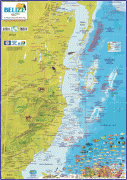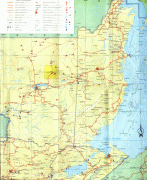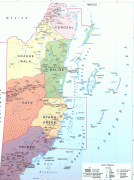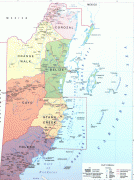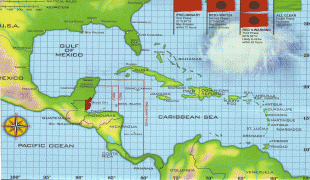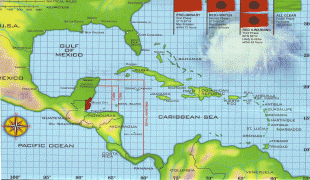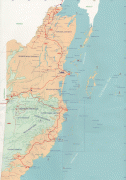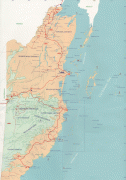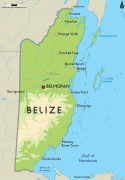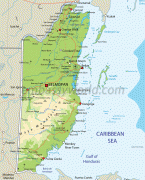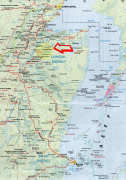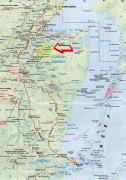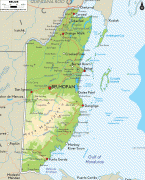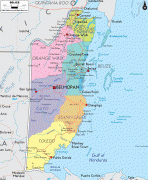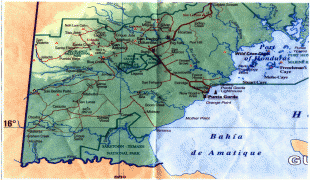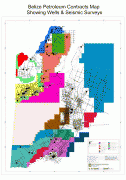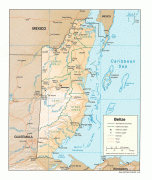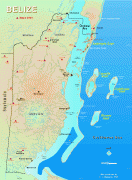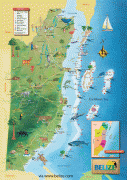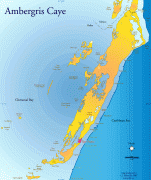Belize
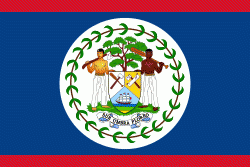 |
 |
| Flag of Belize | |
The Maya civilization spread into the area of Belize between 1500 BC and AD 300 and flourished until about 1200. European contact began in 1492 when Christopher Columbus sailed along the Gulf of Honduras. European exploration was begun by English settlers in 1638. Spain and Britain both laid claim to the land until Britain defeated the Spanish in the Battle of St. George's Caye (1798). In 1840 it became a British colony known as British Honduras, and a Crown colony in 1862. Belize achieved its independence from the United Kingdom on 21 September 1981. It is the only mainland Central American country which is a Commonwealth realm, with King Charles III as its monarch and head of state, represented by a governor-general.
Belize has a diverse society composed of many cultures and languages, reflecting its rich history. It is the only Central American country where English is the official language, while Belizean Creole is the most widely spoken dialect. Spanish is the second-most-commonly-spoken language, followed by the Mayan languages, German dialects, and Garifuna. Over half the population is multilingual, due to the diverse linguistic backgrounds of the population. It is known for its September Celebrations, its extensive barrier reef coral reefs, and punta music.
Belize's abundance of terrestrial and marine species and its diversity of ecosystems give it a key place in the globally significant Mesoamerican Biological Corridor. It is considered a Central American and Caribbean nation with strong ties to both the American and Caribbean regions. It is a member of the Caribbean Community (CARICOM), the Community of Latin American and Caribbean States (CELAC), and the Central American Integration System (SICA), the only country to hold full membership in all three regional organizations.
The earliest known record of the name "Belize" appears in the journal of the Dominican priest Fray José Delgado, dating to 1677. Delgado recorded the names of three major rivers that he crossed while travelling north along the Caribbean coast: Rio Soyte, Rio Kibum, and Rio Balis. The names of these waterways, which correspond to the Sittee River, Sibun River, and Belize River, were provided to Delgado by his translator. It has been proposed that Delgado's "Balis" was actually the Mayan word belix (or belize), meaning "muddy-watered". More recently, it has been proposed that the name comes from the Mayan phrase "bel Itza", meaning "the road to Itza".
In the 1820s, the Creole elite of Belize invented the legend that the toponym Belize derived from the Spanish pronunciation of the name of a Scottish buccaneer, Peter Wallace, who established a settlement at the mouth of the Belize River in 1638. There is no proof that buccaneers settled in this area and the very existence of Wallace is considered a myth. Writers and historians have suggested several other possible etymologies, including postulated French and African origins.
Currency / Language
| ISO | Currency | Symbol | Significant figures |
|---|---|---|---|
| BZD | Belize dollar | $ | 2 |
| ISO | Language |
|---|---|
| EN | English language |
| ES | Spanish language |






